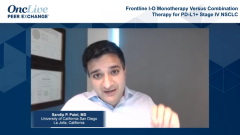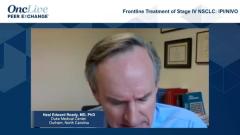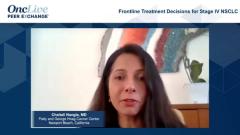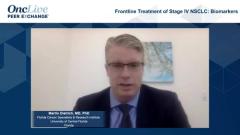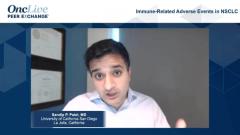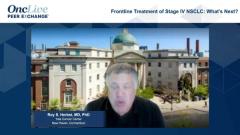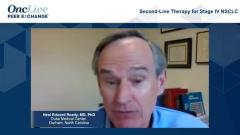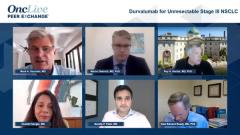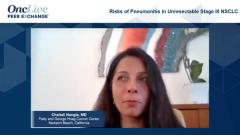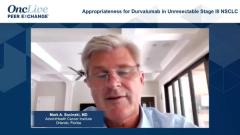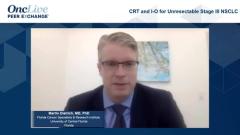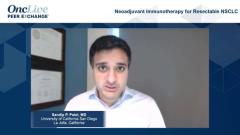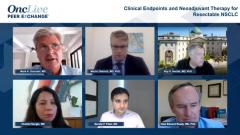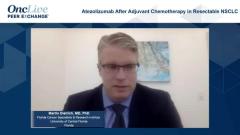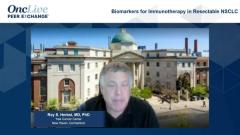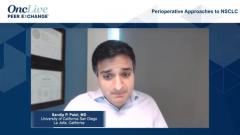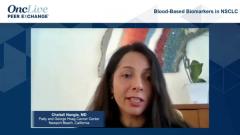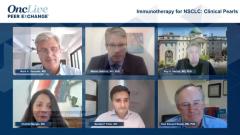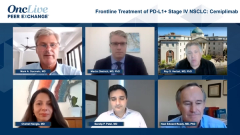
Immune-Related Adverse Events in NSCLC
Recommendations for managing immune-related adverse events associated with checkpoint inhibitors used to treat stage IV non–small cell lung cancer.
Episodes in this series

Mark A. Socinski, MD: Let me ask Sandip, one of the things that we haven’t talked a lot about is the [adverse] effects of immunotherapy [IO], although many of us feel that as a general class of drugs, these IO agents are generally pretty well tolerated in this setting. What’s the message for our audience about immune-related adverse events [IRAEs] and in their recognition and management? Do you have any golden pearls you can share with us, Sandip?
Sandip P. Patel, MD: I think these therapies are remarkably effective immunotherapies that we’ve been discussing, but they don’t come without toxicity, and the double-edged sword of the immune response is friendly fire against the healthy tissue and you can get autoimmune toxicities. In lung cancer the toxicity that’s probably the most vexing in our practices is pneumonitis. Immune-mediated pneumonitis, it often mimics various other entities that our patients with lung cancer are particularly prone to, whether it’s a COPD [chronic obstructive pulmonary disease] flare; an infection, especially most recently with COVID-19; pulmonary embolism; disease progression. So these patients invariably get a CT chest shot to try to better understand, and the problem with a lot of immune-related adverse events is there is not a specific blood test that tells you that this is an immune-related phenomena. You’ll get a liver function test, or you’ll get a CT that shows that something is wrong. You’ll try to rule everything else out, but the problem with almost all our immune-related adverse events is that they are diagnoses of exclusion. With that, you’re ruling out other things, and you’re empirically beginning therapy.
My humble 2 pieces of advice related to IRAEs are, No. 1, have a high index of suspicion. If the patient is more short of breath than usual or is starting to have diarrhea, rule out Clostridioides difficile, but be prepared to treat this as immune colitis. The second is start the steroids early, especially once you’ve ruled out infection, which you can often do quite rapidly with a procalcitonin, for example. Or treat concurrently with the steroids and antibiotics for a really severe case of let’s say colitis while you’re waiting for the results to come back and waiting for specialty expertise because I’ve never seen anyone regret giving steroids too soon. I’ve only seen people regret not starting steroids soon enough. Then finally, there was a nice abstract at ASCO [American Society of Clinical Oncology annual meeting]…that looked at what to do if steroids don’t work. I think the message there is if you have immune-related colitis, meaning you’ve ruled out C diff, which unfortunately can be common in this patient population, infliximab or another anti-TNF [tumor necrosis factor] can be efficacious. But above and beyond that, our options start to become increasingly potentially problematic for patients, including drugs that block T cells, such as mycophenolate. You may use drugs that block movement of immune cells into normal tissues, like vedolizumab, and I think it gets really complicated at that point. But the one point I should make about steroids is this isn’t your 5-day COPD burst. If you’re treating an immune-related adverse event, you want to have at least a 3-week steroid taper, and probably closer to a month, maybe slightly over a month because if you don’t, the likelihood of this immune-related adverse event coming back, whatever it is, is quite high.
Mark A. Socinski, MD: We presented some data at the recent ASCO that having a low-grade immune adverse event might be a good thing in this setting. Of course, it was also true on the control arm of the analysis of IMpower150, 130, 132, so any thoughts on this? Because I do agree with your comment that understanding the spectrum of toxicity can affect almost any organ and to recognize that, hopefully when it’s grade 1 or 2, be early in treating it and preventing it from being 3 or 4. And that was kind of the message from that analysis.
Sandip P. Patel, MD: Absolutely, and it’s a great summary of a very complicated data set. I think the broad theme across the studies you mentioned, as well as other, especially some retrospective analyses, is that the development of an immune-related adverse event means the immunotherapy is doing something to the immune response. And as you’re elevating the temperature, so to speak, of the immune system, hopefully more of that heat is directed at the cancer, but some can be directed at friendly organs as well, and so there is this correlation that I think has been seen across multiple data bases. I’m not a 100% there, but I think most of us have seen it, that most of those patients who develop IRAEs often are the ones who get benefit. That does not mean you have to get one of these autoimmune toxicities to benefit from immunotherapy, but what it does mean is that for those patients who do develop an immune-related adverse event, the question about rechallenge often involves the severity of the toxicity, how life threatening it was, how salvageable it was with steroids that are immunosuppressive. But if you also know that that patient who had that immune toxicity has a pretty good prognosis long term, it means you can take a break. You can watch with serial CT scans and see if the immune system has taken care of the cancer as well as it caused toxicity on normal epithelium. I think that’s probably where that data set is most relevant to most people’s clinical practice.
TRANSCRIPT EDITED FOR CLARITY


